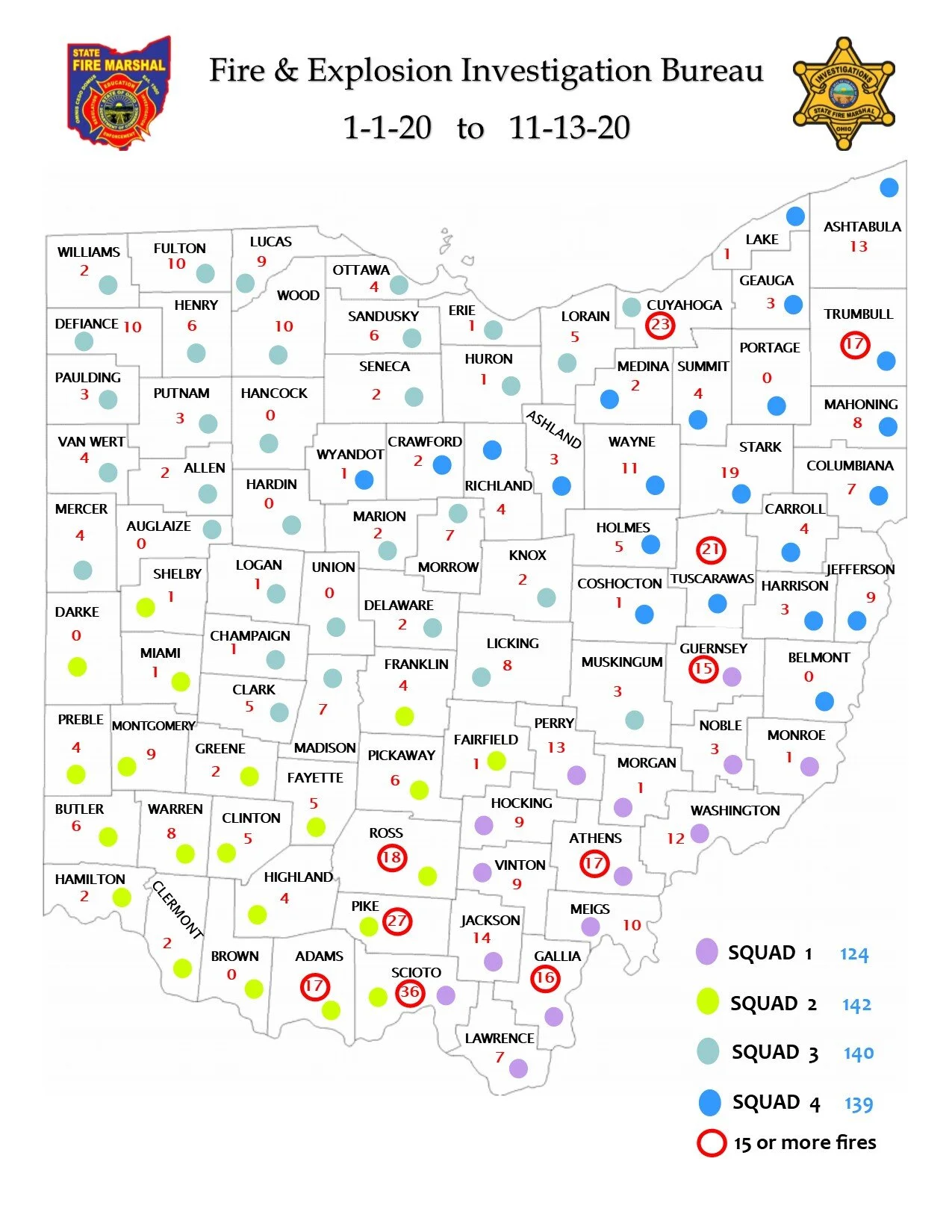How the Ohio Fire Marshal serves Athens County
Number of incidents investigated in Ohio by the State Fire and Explosion Investigation Bureau. Graphic courtesy of the Ohio Fire Marshal.
Athens County is one of the busiest counties in the state for the Ohio Fire Marshal, with 17 investigations into fires during 2020 alone.
Southern Ohio is also the busiest region in the state for the fire marshal’s office. Six Southern Ohio counties — Athens, Pike, Ross, Adams, Scioto and Gallia — make up roughly 25% of the total fires investigated in 2020.
Josh Hobbs, the Fire and Explosion Investigations Bureau Chief of the Ohio State Fire Marshal office, said the region lacks investigative manpower, requiring frequent visits from the fire marshal.
“We have to do more in those counties as an agency. When they request us to Athens, Vinton, Pike or Jackson, the expectation for our office is that we are doing it all,” Hobbs said. “If we get requested to a suburban area we might just be doing origin and cause [of the fire].”
Any local authority, from a member of the fire department to the county coroner, can request that the fire marshal look into a fire, Hobbs said. Once the request is received, an experienced member of the marshal’s office will gage the seriousness of the request and dispatch a marshal to look into the incident.
Upon arriving at the scene, the investigator will see what information has already been discovered and determine what resources are required for the investigation.
Athens County
Ohio University utilizes the fire marshal’s office every September through its campus fire safety month program, which helps to educate students on fire safety in dorms and campus buildings. The marshal also performs inspections on university buildings, which allows the Athens City Fire Department to perform inspections elsewhere in the city.
“[The fire marshal] has a code enforcement officer who comes and does all the inspections on all the university buildings,” Athens City Fire Chief Robert Rymer said. “We don’t have a full-time fire inspector, and with all the things that we do, there is just no way we could keep up with the 900 businesses that we inspect throughout the city plus the university.”
The Athens City Fire Department also benefits from the Multi-Agency Radio Communications System (MARCS) run by the fire marshal. The radio system provides fire departments throughout Ohio the ability to communicate with other departments all over the state.
To help departments get access to this system, the marshal office created the MARCS grant, which provides up to $50,000 for the purchase of MARCS radios. The Athens City Fire Department used this grant to purchase the radio system last year and cover the monthly fees related to the radio system.
The Ohio State Fire Marshal employs 160 full-time employees and another 100 part-time employees. Many of these part-timers work for the Ohio Fire Academy, a school run by the marshal that trains and teaches new firefighters how to do the job.
Rymer spoke highly of both the academy and of the fire marshal in general, praising them for both their cooperation and advocacy for firefighters in the statehouse.
“They’ve done a great job helping us out. I don’t know if there’s ever been a time where I’ve called them or sent an email and haven't gotten a response within a day or two,” Rymer said. “They have always been there anytime I ask.”
Fire education
Fire education and prevention is something Ohio State Fire Marshal Kevin Reardon prioritizes. Reardon was recently appointed to the role by Gov. Mike DeWine and has been working in fire safety since 1981.
“We try to get children as early as we can to think about fire safety. As they get older, we can get those students to bring information home to their parents about creating a home fire safety plan,” Reardon said.
Reardon’s belief in fire education and its impact on safety stems from the rise of smoke detectors in the last few decades.
“Low income areas notoriously didn’t have many smoke detectors. So, in almost any city of any size, you have a lot of fires in low income areas that create injuries and fatalities,” Reardon said. “You can go into that area and correct that by educating tenants and property owners about the need for smoke detectors … overtime, you’ll see that trend for injuries and fatalities decrease, and that's exactly what happened with smoke detectors over the last 20 years.”
Insurance and funding
The Fire Marshal receives funding from a wide variety of sources. A large portion of its budget comes from inspections of hotels and motels, fines on fire code violations and fees from firework manufacturers and vendors.
It also receives federal grant money from the Environmental Protection Agency to perform inspections on underground gasoline and petroleum tanks. Additionally, the marshal's office receives funding from insurance companies, as a portion of fire insurance premiums go to the department, President of the Ohio Insurance Institute Dean Fadel said.
“0.25% of all fire insurance premiums are taxed to operate the state fire marshal's office,” Fadel said. “Insurance companies rely heavily on the state fire marshal's office when it comes to arson related incidents.”
Insurance companies often have an eye on how the investigation is going and assist the department in their investigations whenever possible.
“[Insurance companies and the fire marshal] will share information. If there’s an arson or suspected arson the company’s going to share information with the investigator,” Fadel said. “Sometimes they will have their own investigator, and those investigators will work in concert with the state fire marshal office.”
Like Rymer, Fadel spoke highly of the fire marshal’s office. He described the employees as professional and noted that he has never heard anyone complain about its performance.

